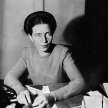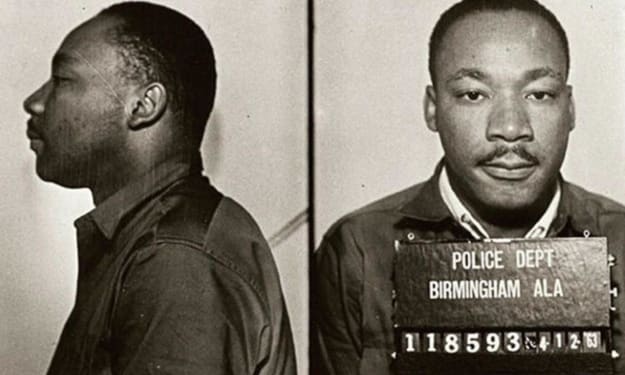Don't Judge a Book by it's Moleskine Cover.
The most beautiful book you'll ever lay hands on.

The first time he sinned he was five.
Little Annie, worrying her plaits to distraction drops her ribbon in church. Ma had told her to stop fidgeting but her small fingers worked the hair loose during Psalm 36 while their mother’s eyes were fixed on the pulpit and her two children squirmed in the dust.
Annie’s ribbon falls between Maggie Macallan’s ankles. Ma had told her not to lose it as she tied her daughter’s in a plait that morning. It is a yellow ribbon; thin and velvet and Annie whimpers to see it lying dirty.
It lies on the ground between Maggie’s ankles. Her right sock bunches under the heel of her shoe, her bare ankle luminescent in the fragile spattering of light cast from stained-glass windows.
Bending down to pick it up, he did not think of God.
He only wanted to touch her - to feel the smoothness of skin under his fingers like white paper.
The small black-bound book came swinging through the air. Father Joseph clips him around the back of the ears.
“Lust’ll condemn yer mortal soul ter the confines o’ hell if I catch yer peepin agin Jacob Campbell,” the old man says ruefully taking aim again. “Your Da should leather ye. Home sick agin is he, aye?”
“He’d be here for sure Father, were it not for t’ fever,” says Ma. “He’ll be here next week – God willing.”
Their Father Joseph knows about lies. He bows his head and says nothing.
***
Next time he sinned, he was nine.
Maggie Macallan sits reading across the way from him, her mother picking apples from the grocer. He watches her turn the pages of her book while her mother turns apples in their crate searching for bruises. Da, quartering pigs cuffs him soundly.
“Yer a bleedin’ chip off t’ old block. Waste yer time chasing girls like your Pa and I’ll hide yer,” he says and looks sad.
“I was just looking”, he says.
“Aye, but looking’s never just looking now is it?”
Mrs Macallan pushes five green apples into her bag. Da’s looks small as he stares down at the pig blood on his shoes.
“Father Joseph says, “A man who uses his body for lechery wrongs the Lord.”
“So?” says Da, distracted.
“So, I’m just looking.”
“Lust is a sin. Ye know what I mean. Stop playin’ dumb.”
They haul the bodies out back while Ma watches. Little Annie wraps lamb chops in wax paper. Da is back out front skinning rabbits, the corners of his lips pulled down to his chin in a scowl. He brings three in, laying them on the counter for Jacob to slice.
“You’re just like your father”, Ma says watching her son decapitate rabbits. “Aye, you’ve got my temperament, but you have that same lust."
***
By the time he understood what sin was, he was fourteen and almost a man.
Maggie and her sister were down by the river and he, hidden behind a tree. Her hair was in plaits – tied up at her ears and he watches from afar. The girls are frightened; they talk of war, love and the future as they splash in the shallows and as they do it is clear they are still just girls. Maggie, her hand at her chest, flush rising up her cheeks says she should like to marry a soldier. She says she would like for a man to keep a picture of her close in his jacket, to write long postcards of love across the ocean and to die with her name on his lips.
In that moment, he envies the water lapping at her ankles; the intimacy of touch - engulfing her. He feels a kinship with the pebbles she is ignoring under the webs of her feet.
He moves involuntarily – and the girls look round in unison. “The Butcher’s Boy,” sneers Louise Macallan. “His Da’s a drunk an’ his Ma’s mad wi’ grief." But Maggie’s voice rings out loudest. “The Butcher’s Boy’s a pervert,” as he runs away.
***
Last time he saw Maggie Macallan, he was still a boy.
He signs up for war first chance he could – scratched his name into the little black conscription book and for the first time saw a glint of pride in Father Joseph’s eye. He went partly because, as Father Joseph said – it was their duty to King and Country to die as gentlemen with a woman’s name on their lips and partly because he cannot bear to watch his mother erode anymore. The stitches at the corners of her being are wearing thin. Something has broken within her; even Little Annie can no longer get through to her. Little Annie is fourteen now and almost a woman. She plaits her own hair, cares for the shop and no longer cares about yellow ribbons.
Da died the year before. He felt indifferent to see his father laid out in the ground before them. Ma cried for all of them; Little Annie stared at the sky and he looked at his father. Da looked calmer in death; a smile played around his lips as if in dying he had finally found an answer to his unhappiness.
For a while now he has felt like a voyeur of death. The night before leaving he sat in the shop watching rain lash the windows, getting solemnly drunk between the pig carcasses when Ma found him. He sees Maggie Macallan at the station waving off a boy who never comes back. Her hair is down, she presses a locket in her soldier’s hand, begging him to write long and often.
***
The next time he sees Maggie Macallan, her hair is tight curls. It is after the war and this was the fashion with the women in Paris she says indifferently. She asks if he saw much of the city, the women and the fashion over there saying, “Oh, yes, I’ve travelled too,” before waiting for his reply.
Mrs Macallan still stops at the grocers across the way to turn over apples for bruises before coming in the shop while her daughter stares right through him.
He is not the same boy she despised as a child. For so long she held him captive of her cold indifference and silently he begs her to look at him now, as a man. She would see he was no longer that same slight poltergeist limping along in her shadow for hope of a glimpse of the pale flesh she had volunteered at the altar an eternity ago.
He thinks he finally understands religion. For what the Lord giveth, he also taketh away. War had made him such a God. War had finally taught him what church was for; that decadent housing of the deceased bringing peace to wretched lives and wretched sin through prayer. He thinks the moments he has shared with dying were his most intimate; the closest to love and quiet he has ever known.
Mrs Macallan stops to ponder the price of meat. Since when were pork chops so expensive? Her fingers brush the packaged meat searching for flaws. Maggie watches shrewdly and he feels both small and angry to think of her looking at him in the same way in which her mother is now turning over pork flesh. Mrs Macallan chooses her pork chops, a lamb rack and sausages for Sunday lunch. He says he has heard talk Mr Macallan is wanting an apprentice. Not enough men returned from the war and too many that have are broken. Would she ask for him? He is strong, eager and willing. Maggie Macallan smirks to think of the butcher’s boy in her father’s shop.
“The Butcher’s boy, a tanner?” says Maggie. “War has changed you Jacob Campbell, but not enough.”
***
Mr MacCallan was protective of all he owned; his business and his offspring. He worried his lack of a son would see the legacy of four proud generations crumble into nothing. He was unwilling to hand either his daughter or business over to some arrogant Yank to defile, degrade and abandon. His eldest - Louise - was being courted by such a brute and he was anxious to defend Maggie from the same fate.
“I’ll make you a deal boy” he said eventually when Jacob approached him. “Work under my lead for seven years, learn the leather trade and I'll give you my daughter an’ you’ll keep the business after I’m gone.”
He agrees; he longed to be near Maggie and her pale flesh. Seven years was nothing to the years of lustful longing he endured.
***
Seven years came and went; Jacob worked the long hours set without complaint. He learnt how to stretch and tan leather, to soften the skin in barrels of lime and how to scrape flesh, hair and sinew from the hide. Business flourished and Jacob found he was not averse to hard work. His speciality was books; perhaps it was the early influence of Father Joseph and the impact his little black bible had left as it wrapped itself around his ears but such was his skill that Macallan’s leather-bound books soon took off.
One evening found Jacob working late in the cellar. Father Andrew had commissioned a new bible for the church having finally worn his thin from years thumping miscreants during mass. However, tonight he lacks inspiration; the leather limp, flaccid and unyielding – his mind; blank.
The door creaks open and a light flurry of footsteps descends. He sees ankles before he sees her; Maggie’s hair up in a hurried bun.
She barrels past him; throws a letter onto her father’s desk, opening drawers at random. He may as well be translucent, he thinks; she did not seem to have even noticed. It fills him with anger. He was working to prove himself for her; how did she not recognise all he had sacrificed just to be near her? Prostrating himself, effacing himself, debasing himself, and all for her? The slight of her shoulder on his enraged him in the way only Maggie could. Love has its multitudes, he reminds himself.
“Maggie, I’m here. Please, don’t say you don’t see me”.
Maggie recoils, of course Jacob was skulking and hiding in the basement.
“I’ve a soldier waiting for me in Paris. I’ll never forgive you two for bartering me like livestock. I am neither of yours to have nor give” she spits; seven years rage running up her spine out her mouth.
Where was his concern for her desires? She despises that pathetic creature, Jacob Campbell. She imagines crushing him with her feet whenever she catches his lecherous looks; his eyes small, black and locust-like. He is never as subtle as he thinks he is – men rarely are. She shivers with disgust from the inside out just from being near him. Maggie turns to climb the stairs; relieved to never have to entertain the thought of that insect again and Jacob panics; the idea of his perfect ending was walking away. His lust would be sanctified, justified, forgiven if he made that woman his wife. She was his destiny; it always was. “Wherever you are my love; I am behind you,” he thinks moving toward the door.
He lurches forward, grabbing Maggie by that tempting, pale ankle he knows so well. He pulls her down the stairs to finally feel her skin under his; hears her head knock each step as she falls. He is not allowing her to ignore him no more.
***
The next day, Mr Macallan found the letter pinned to the shop door. Maggie had upped and left in the night to Paris.
Jacob had been up all night putting the final touches to their masterpiece. He looked tired and wan, fondling a scrap of black leather.
Black bound leather, slim and delicate – the finished project sat on the pulpit tied up with a yellow ribbon in the fragile spattering of light cast from stained-glass windows.
About the Creator
Philosofemme.
We exist to widen relevant philosophical discussions to make them radically inclusive, diverse and accessible to all. For too long; philosophy has been unapproachable and gate-kept by an academic elite.
https://www.philosofemme.blog/






Comments
There are no comments for this story
Be the first to respond and start the conversation.